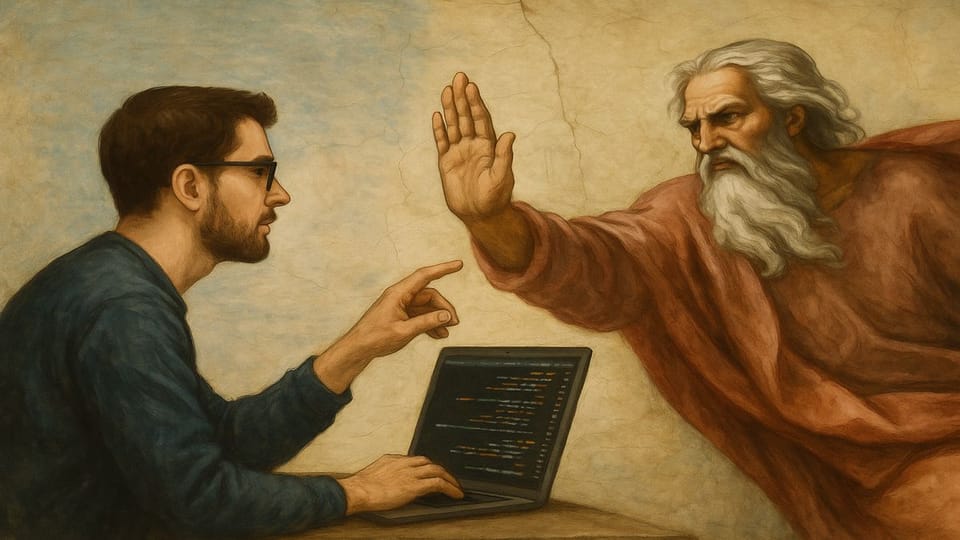Not So Random: What the Math Says About God

As AI learns to reason, and quantum computers peer into the fabric of reality, are we simply building smarter machines or are we brushing up against the divine? Four hundred years ago, Galileo’s telescope shattered the Church’s grip on the cosmos. Today, artificial intelligence may be doing the same, only this time, it’s atheism that's under pressure. As machines begin to think, create, and even question their own existence, they are inadvertently echoing the oldest spiritual questions: Why are we here? Is this all designed?
In just the past few years, humanity has crossed an invisible threshold. Artificial Intelligence, once a science fiction novelty, is now capable of generating human-like conversation, writing software, creating art, and even engaging in philosophical debate. At the same time, quantum computing, once limited to theoretical whiteboards, has begun performing calculations so complex that no traditional supercomputer could match it. What’s unfolding is not just a leap in raw processing power, but a transformation in how we interact with knowledge, creativity, and even consciousness itself. For many, it’s thrilling. For others, unsettling.
Quantum computers like Google’s Sycamore and IBM’s Condor aren’t just faster, they operate on a completely different level of reality. While traditional supercomputers use bits (0 or 1), quantum machines use qubits that can represent 0 and 1 simultaneously, allowing them to process millions of possibilities at once. Google’s quantum processor once solved a benchmark problem in 200 seconds that would take a classical supercomputer 10,000 years. When you combine this raw quantum power with the reasoning and learning capabilities of modern AI, you get a system capable of exploring very deep and complex questions. As these machines simulate reality, evaluate fine-tuned constants, and uncover patterns too precise to be random, they begin to echo what philosophers and physicists alike have long suggested: this universe may not be an accident.
I asked ChatGPT "what are the mathematical odds of the universe being created by chance rather than by design"? Here is a basic summary of its response:
Many physicists argue that the universe appears “fine-tuned” for life. That is, if certain fundamental constants (like the gravitational constant, the strong nuclear force, etc.) were even slightly different, life as we know it could not exist.
Here are a few examples:
- The cosmological constant (dark energy): If it were off by 1 part in 10¹²°, the universe would have either collapsed or expanded too fast for galaxies to form.
- The strong nuclear force: If it were 2% stronger, diprotons would form in stars and hydrogen would be used up too fast.
- The electromagnetic force vs gravity: Their ratio is about 10³⁶. A tiny difference would prevent stars and planets from forming.
Probability estimates made by some physicists (though speculative):
- Roger Penrose estimated the odds of the low-entropy conditions at the Big Bang (needed for our universe) to be about 1 in 10^10^123 - an incomprehensibly small number.
- Fred Hoyle once remarked the odds of the right carbon-producing resonance in nuclear fusion happening by chance are comparable to a tornado assembling a Boeing 747 from junkyard debris.
You can try asking similar questions against an AI engine of your choice, but the mathematics never lies. Make of that what you will, but atheism may be about to go out of fashion very, very soon.
In this video titled "We Asked Artificial Intelligence to PROVE God. This is what ...", the creator asks AI to assess the existence or the hand of God in the universe.
When Google’s most advanced quantum computer ran a routine simulation, no one expected what emerged next. Hidden in a sea of quantum data was an image—unnerving, symmetrical, and eerily face-like. Dubbed The Observer, it wasn’t drawn, coded, or imagined. It simply appeared.
As AI and quantum computing uncover deeper truths about our universe, the line between science and something greater begins to blur.
Was it all just math and matter—or is there meaning?
I’d love to hear your thoughts, so maybe leave a comment below.
And if this sparked something in you, consider sharing it with someone who’s asking the same questions.
Member discussion